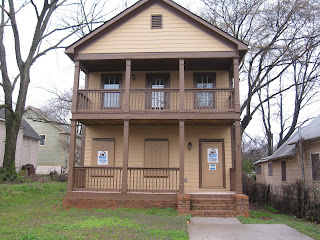Homeowner associations foreclose on residents - USATODAY.comHomeowner associations foreclose on residents
By Tamara Lush, Associated Press
The Inlet House condo complex in Fort Pierce, Fla., was once the kind of place the 55-and-older set aspired to. It was affordable. The pool and clubhouse were tidy, the lawns freshly snipped. Residents, push-carts in tow, walked to the beach, the bank, the beauty parlor, the cinema and the supermarket. In post-crash America, this was a dreamy little spot. Especially on a fixed income.
But that was Inlet House before the rats started chewing through the toilet seats in vacant units and sewage started seeping from the ceiling. Before condos that were worth $79,000 four years ago sold for as little as $3,000. And before the homeowners' association levied $6,000 assessments on everyone — and then foreclosed on seniors who couldn't pay the association bill, even if they didn't owe the bank a dime.
Normally, it's the bankers who go after delinquent homeowners. But in communities governed by the mighty homeowners' association, as the sour economy leaves more people unable to pay their fees, it's neighbor vs. neighbor.
"What the board is doing is trying to foreclose on people to force people out the door," says Mike Silvestri, 75, who stopped paying his dues at Inlet House in protest over what he considers unnecessary and unaffordable assessments.
He and others say there were cheaper ways to deal with the rat infestation and leaky sewage that led the board to order up a costly plumbing overhaul. "They are bamboozling old people. I'm old, but I'm not senile," he says.
In exchange for adhering to the rules, homeowners got safe communities with clubhouses, pools and tennis courts. But what many didn't realize when they bought their homes was that the fine print gave the association the right to foreclose — even over a few hundred dollars in unpaid dues.
All the association board has to do is alert its attorney to place a lien on the property to start the process. The home can then be auctioned by the board until the bank eventually takes ownership. Homeowners typically have no right to a hearing.
In the past, housing associations have gained infamy for dictating everything from the weight of your dog (one mandated a diet for a hound) to whether you can kiss in your driveway (not if you don't want a fine in one). Homeowners' associations have served as the behavior police, banning lemonade stands, solar panels and hanging out in the garage. One ordered a war hero to take down his flag because of a "non-conforming" pole. Another demanded that residents with brown spots on their lawns dye their grass green.
Now, past the faux regal gates, beyond the clubhouses, many property owners in associations owe more than their homes are worth. Some are struggling to pay their bills after they lose a job. Others have had their pay cut. So they've stopped paying their association dues.
To combat the rise in delinquencies, boards are switching off utilities, garnishing income and axing cable. They are yanking pool passes and banning the billiard room. And, in the most extreme cases, they are foreclosing.
"The treacherous part is that homeowners' associations are acting like a local government without restraints, and they have this extraordinary power," says Marjorie Murray, a lawyer and founder of the Center for California Homeowner Association Law.
Today, one in five U.S. homeowners is subject to the will of the homeowners' association, whose boards oversee 24.4 million homes. More than 80% of newly constructed homes in the U.S are in association communities.
And of the nation's 300,000 homeowners' associations, more than 50% now face "serious financial problems," according to a September survey by the Community Association Institute. An October survey found that 65% of homeowners' associations have delinquency rates higher than 5%, up from 19% of associations in 2005.
Associations set rules for their communities. They levy monthly dues, typically between $200 and $500, and cover the costs of services that a municipal government usually takes care of: road repair, streetlights, sewage systems. If an association's budget is strained or major repairs need to be done, the board can levy a "special assessment" on top of those dues. And when one homeowner doesn't pay those fees, all the other homeowners have to pick up the cost.
The rise in delinquencies comes as banks are taking over foreclosed homes and then leaving them vacant more often than ever. Taken together, these shortfalls are resulting in higher fees for all of the other homeowners — and massive financial angst for association boards.
Before now, associations rarely, if ever, foreclosed on homeowners. But today, encouraged by a new industry of lawyers and consultants, boards are increasingly foreclosing on people 60 days past due on association fees, says Evan McKenzie, a former homeowner association attorney who is now a University of Illinois political science professor and the author of the book "Beyond Privatopia: Rethinking Residential Private Government."
The government does not keep statistics on how often homeowners' associations initiate foreclosures. But a non-profit research group found that association-initiated foreclosures in the Houston area jumped from 500 in 1995 to 2,200 in 2007. Most association-related foreclosures in Texas do not go through the judicial process, so the group's analysis represented only a fraction of the foreclosures that housing associations have initiated.
The problems in some communities are resulting in more scrutiny. In Nevada, the FBI is investigating corruption in elections of association boards. In Utah and Arizona, legislators are trying to pass bills that would root out the use of debt-collectors who are alleged to have used thug-like tactics to strongarm residents into paying fees.
State legislatures in California, Arizona, North Carolina, Texas and Florida have taken up legislation that would clamp down on foreclosures.
Not everyone thinks the tactics are out of line, though.
"When people are not paying their assessments, they're not shortchanging some giant multinational corporation. They are taking money directly out of the pockets of their neighbors," says Andrew Fortin, head of government affairs for the trade group the Community Associations Institute.
So the neighborhood feuds are escalating. At Inlet House, one resident claims her fellow senior citizens have turned into vigilantes, vandalizing her car in retaliation for not paying her dues.
In all, 17 of the 60 units are in various stages of delinquency. Paul Gray, a fastidious budgeter, paid off his mortgage long ago and paid all but $2,500 of the Inlet House assessment. The association initiated foreclosure proceedings. A few days after he received the foreclosure notice, Gray suffered another stroke, three friends say. Now he is in a nursing home. He has since paid off the $2,500. His home, worth $89,000 in 2006, is for sale for $18,500.
In the meantime, the board, facing $172,000 in costs from non-payers, has had no choice but to raise dues by an extra $50 a month to an average of $375. Between the assessment and increased dues, some residents complain that they pay more than they would to rent a plush oceanfront spread down the street at the posh Fontainebleau condo complex. Association manager Janice Stinnett, who is also an Inlet House resident, says she isn't to blame, the non-payers are.
"It's unfair that everyone is paying extra to cover these deadbeats," she says.
The board is continuing to make the plumbing repairs that made the assessments necessary to begin with. It will soon issue another special assessment to cover the costs.
To homeowners who opposed the repairs on the grounds that they were too expensive, the entire picture adds up to a crime. Says Silvestri, "What these associations are doing is illegal. It's a fraud."
Copyright 2011 The Associated Press. All rights reserved. This material may not be published, broadcast, rewritten or redistributed.



 The
The 
























 We don't expect
We don't expect 













